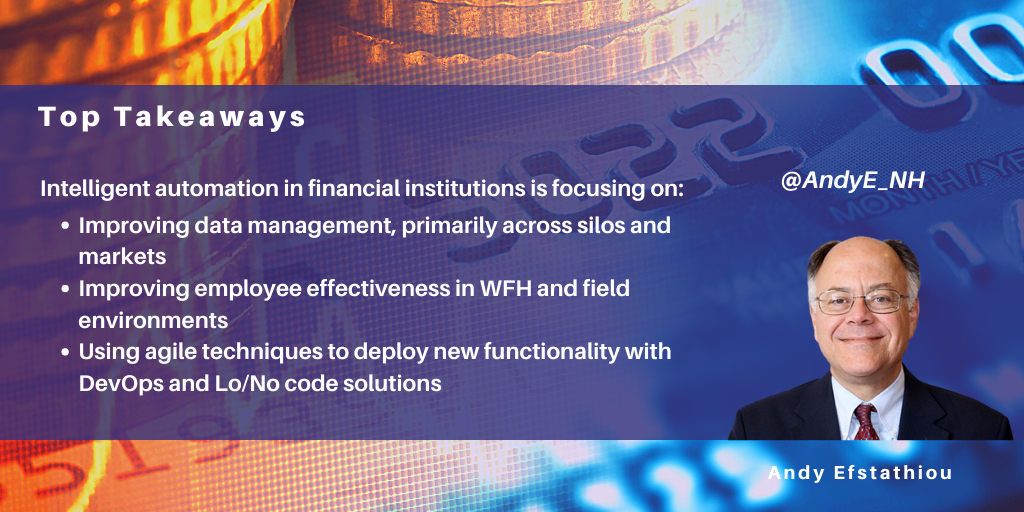posted on Apr 08, 2021 by Andy Efstathiou

NelsonHall recently published a market assessment and forecast report on Intelligent Automation in Banking: Transforming Operations. We found that financial institutions must automate their operations if they are to compete successfully in a rapidly evolving marketplace. Currently, they operate with manual processes using a heterogeneous set of platforms, acquired over many years of M&A. However, the pace of industry change is increasing, while labor-based operations are slowing financial institutions’ abilities to respond. Cognitive, AI and RPA technologies are allowing these institutions to become more agile, cutting the cord from labor-based value-add, without having to do a rip-and-replace of their existing platforms.
The state of IA in financial services
For the past year, financial institutions have been:
- Expanding the use of process discovery to identify new targets
- Standardizing processes across silos
- Focusing on the use of IA for employees for WFH and fieldwork (especially in response to COVID-19)
- Accelerating their delivery from the cloud
- Adopting the use of hybrid AI/RPA to support agents and advisors.
Over the next year, financial institutions will focus on:
- Managing data across silos and markets
- Using agile techniques to deploy new functionality with DevOps and Lo/No code solutions
- Increasing their focus on human/bot teams and their effectiveness
- Applying IA to low-volume manual processes.
However, the external environment has put up barriers to transformation. The key barriers impeding the efforts of financial institutions include:
- Access to emerging technology: all IA services vendors are building ecosystems for emerging technologies and acquiring staff skilled in relevant technologies. Finding the best new technologies and embedding them in effective platforms remains difficult
- Access to qualified staff: changing technologies changes the required mix of staff skills, and emerging tech is driving a skills shortage. Currently, AI is the most constrained capability
- Changing regulations requiring resources to adapt to them
- The COVID-19 induced move to more distributed operations:
- The need to reduce supply chain risk by increasing the distribution of operations
- Increased use of joint human/bot work teams, and how to make them effective
- Shifting delivery to the omnichannel environment and rearchitecting processes
- Changing business models: the advent of digital banks (e.g., Marcus) and the need to create new competitive business models to address this challenge.
Rising to the challenge
To address these challenges successfully, financial institutions need to focus on two activities: vendor selection and execution.
Key factors in vendor selection include:
- Preferred product vendors should have the widest pool of IT services providers supporting them
- Focus on services vendors with skills in process discovery, breadth of solution partnerships, willingness to invest in operations, AI, domain knowledge, and data management capabilities
- Building an ecosystem of vendors with knowledge of client’s business issues; complementary skills to build and deliver IA services;, and the ability to work within client operational practices
- Changing the operational model: banks need to shift from operational leverage (scale economies) to leveraging flexibility (ability to cost-effectively switch out workloads).
Key factors in execution include:
- Preferred vendors should have the widest pool of solution providers supporting them
- Redefining what is delivered by third parties, internal, and cloud to maximize flexibility and speed new intelligence and automation
- Focusing on increasing the yield of use cases by focusing on KPIs for successful use cases
- Transforming application development to a DevOps model to speed the innovation cycle.
In summary, financial institutions are changing their goals in two important ways:
- From improving process efficiency to improving data management
- From improving cost efficiency for static businesses to agility for continuously changing businesses.
The operational changes being made will drive business model change. And these operational changes will drive accelerating change in banks’ product offerings, customer base, and market presence.
Find out more about NelsonHall’s Intelligent Automation in Banking: Transforming Operations market assessment and forecast report here or contact Guy Saunders.
